六年级新版一至三单元的单词短语句子
- 格式:doc
- 大小:46.00 KB
- 文档页数:4
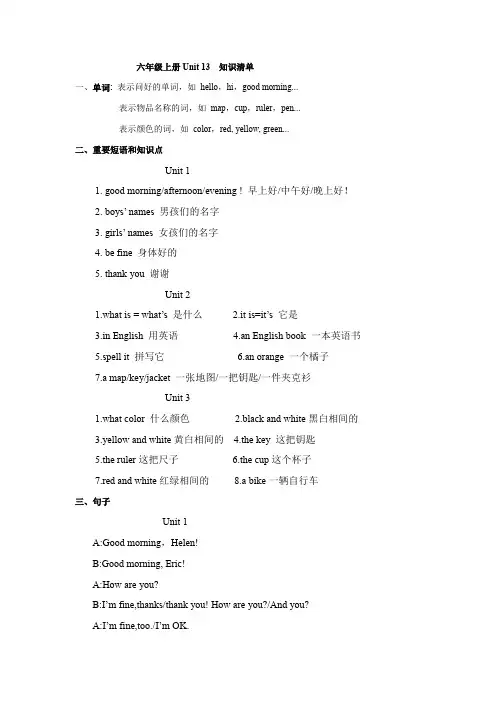
六年级上册Unit 13 知识清单一、单词: 表示问好的单词,如hello,hi,good morning...表示物品名称的词,如map,cup,ruler,pen...表示颜色的词,如color,red, yellow, green...二、重要短语和知识点Unit 11. good morning/afternoon/evening ! 早上好/中午好/晚上好!2. boys’ names 男孩们的名字3. girls’ names 女孩们的名字4. be fine 身体好的5. thank you 谢谢Unit 21.what is = what’s 是什么2.it is=it’s 它是3.in English 用英语4.an English book 一本英语书5.spell it 拼写它6.an orange 一个橘子7.a map/key/jacket 一张地图/一把钥匙/一件夹克衫Unit 31.what color 什么颜色2.black and white黑白相间的3.yellow and white黄白相间的4.the key 这把钥匙5.the ruler这把尺子6.the cup这个杯子7.red and white红绿相间的8.a bike一辆自行车三、句子Unit 1A:Good morning,Helen!B:Good morning, Eric!A:How are you?B:I’m fine,thanks/thank you! How are you?/And you?A:I’m fine,too./I’m OK.A:早上好,海伦!B:早上好,埃里克!A:你好吗?B:我很好,谢谢。
你呢A:我也很好。
Unit 2A:What’s this in English?B:It’s a jacket.A:What’s that in English?B:It’s an orange.A:Spell it,please.B:ORANGE.A:这个用英语怎么说?B:它是一件夹克衫。
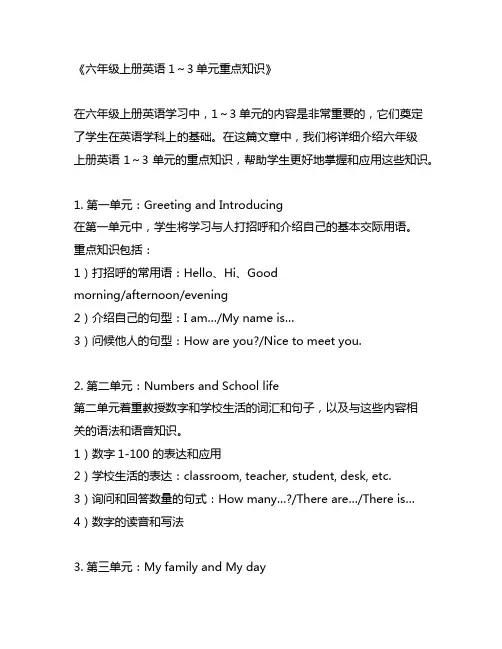
《六年级上册英语1~3单元重点知识》在六年级上册英语学习中,1~3单元的内容是非常重要的,它们奠定了学生在英语学科上的基础。
在这篇文章中,我们将详细介绍六年级上册英语1~3单元的重点知识,帮助学生更好地掌握和应用这些知识。
1. 第一单元:Greeting and Introducing在第一单元中,学生将学习与人打招呼和介绍自己的基本交际用语。
重点知识包括:1)打招呼的常用语:Hello、Hi、Goodmorning/afternoon/evening2)介绍自己的句型:I am…/My name is…3)问候他人的句型:How are you?/Nice to meet you.2. 第二单元:Numbers and School life第二单元着重教授数字和学校生活的词汇和句子,以及与这些内容相关的语法和语音知识。
1)数字1-100的表达和应用2)学校生活的表达:classroom, teacher, student, desk, etc.3)询问和回答数量的句式:How many…?/There are…/There is…4)数字的读音和写法3. 第三单元:My family and My day在第三单元中,学生将学习如何描述自己的家庭和日常生活。
重点内容包括:1)家庭成员的称呼:father, mother, brother, sister, etc.2)家庭成员关系的表达:This is my…/She is my…3)日常生活的描述:get up, have breakfast/lunch/dinner, go to bed, etc.4)时间的表达和描述:morning, afternoon, evening, etc.以上是六年级上册英语1~3单元的重点知识,掌握这些知识对于学生来说是非常重要的。
在学习过程中,学生应该注重听、说、读、写的综合训练,同时注重语言环境的营造,培养学生的英语思维和表达能力。
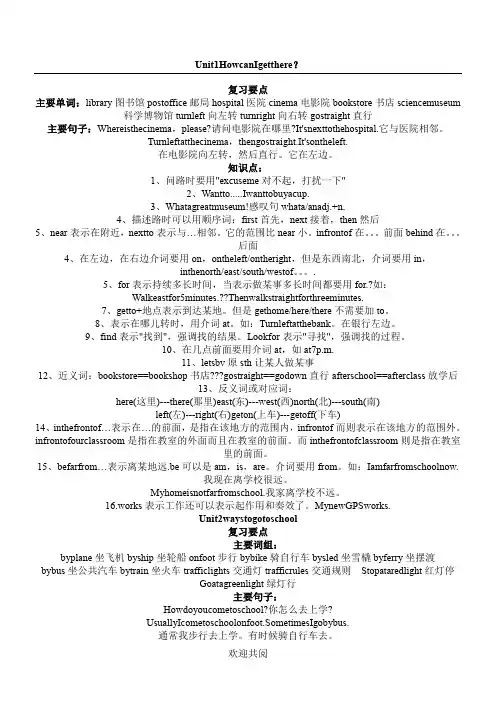
Unit1HowcanIgetthere?复习要点主要单词:library图书馆postoffice邮局hospital医院cinema电影院bookstore书店sciencemuseum 科学博物馆turnleft向左转turnright向右转gostraight直行主要句子:Whereisthecinema,please?请问电影院在哪里?It'snexttothehospital.它与医院相邻。
Turnleftatthecinema,thengostraight.It'sontheleft.在电影院向左转,然后直行。
它在左边。
知识点:1、问路时要用"excuseme对不起,打扰一下"2、Wantto.....Iwanttobuyacup.3、Whatagreatmuseum!感叹句whata/anadj.+n.4、描述路时可以用顺序词:first首先,next接着,then然后5、near表示在附近,nextto表示与…相邻。
它的范围比near小。
infrontof在。
前面behind在。
后面4、在左边,在右边介词要用on,ontheleft/ontheright,但是东西南北,介词要用in,inthenorth/east/south/westof。
.5、for表示持续多长时间,当表示做某事多长时间都要用for.?如:Walkeastfor5minutes.??Thenwalkstraightforthreeminutes.7、getto+地点表示到达某地。
但是gethome/here/there不需要加to。
8、表示在哪儿转时,用介词at。
如:Turnleftatthebank。
在银行左边。
9、find表示"找到",强调找的结果。
Lookfor表示"寻找",强调找的过程。
10、在几点前面要用介词at,如at7p.m.11、letsbv原sth让某人做某事12、近义词:bookstore==bookshop书店???gostraight==godown直行afterschool==afterclass放学后13、反义词或对应词:here(这里)---there(那里)east(东)---west(西)north(北)---south(南)left(左)---right(右)geton(上车)---getoff(下车)14、inthefrontof…表示在…的前面,是指在该地方的范围内,infrontof而则表示在该地方的范围外。
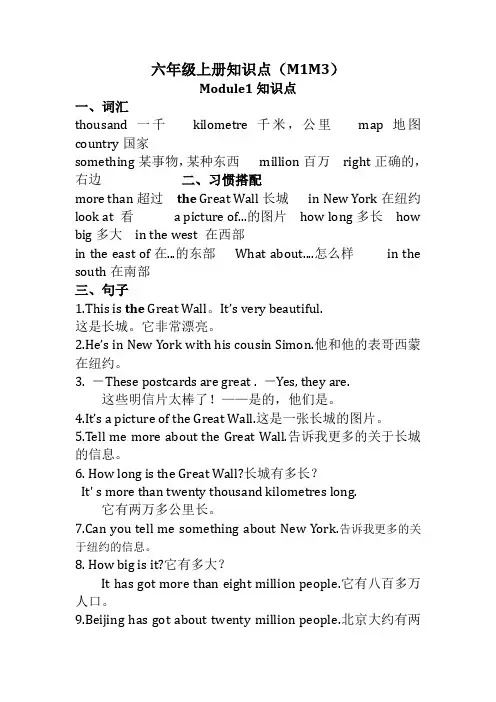
六年级上册知识点(M1M3)Module1知识点一、词汇thousand一千kilometre千米,公里map 地图country国家something某事物,某种东西million百万right正确的,右边二、习惯搭配more than超过the Great Wall长城in New York在纽约look at 看 a picture of...的图片how long多长how big多大in the west 在西部in the east of在...的东部What about....怎么样in the south在南部三、句子1.This is the Great Wall。
It’s very beautiful.这是长城。
它非常漂亮。
2.He’s in New York with his cousin Simon.他和他的表哥西蒙在纽约。
3. -These postcards are great . -Yes, they are.这些明信片太棒了!——是的,他们是。
4.It’s a picture of the Great Wall.这是一张长城的图片。
5.Tell me more about the Great Wall.告诉我更多的关于长城的信息。
6. How long is the Great Wall?长城有多长?It' s more than twenty thousand kilometres long.它有两万多公里长。
7.Can you tell me something about New York.告诉我更多的关于纽约的信息。
8. How big is it?它有多大?It has got more than eight million people.它有八百多万人口。
9.Beijing has got about twenty million people.北京大约有两千万人口。
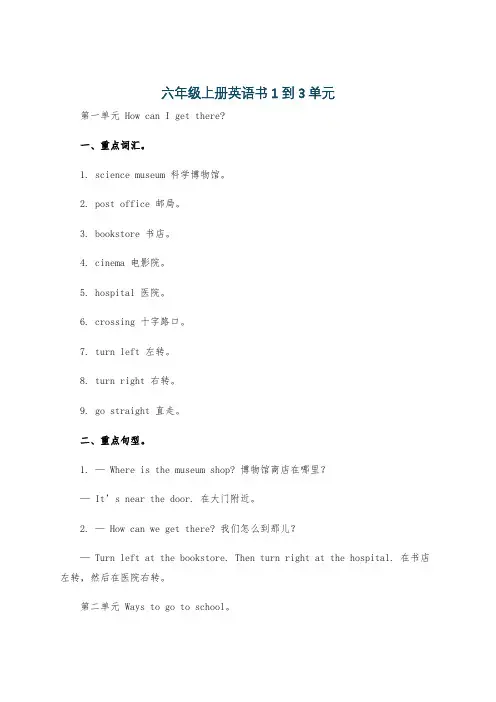
六年级上册英语书1到3单元第一单元 How can I get there?一、重点词汇。
1. science museum 科学博物馆。
2. post office 邮局。
3. bookstore 书店。
4. cinema 电影院。
5. hospital 医院。
6. crossing 十字路口。
7. turn left 左转。
8. turn right 右转。
9. go straight 直走。
二、重点句型。
1. — Where is the museum shop? 博物馆商店在哪里?— It’s near the door. 在大门附近。
2. — How can we get there? 我们怎么到那儿?— Turn left at the bookstore. Then turn right at the hospital. 在书店左转,然后在医院右转。
第二单元 Ways to go to school。
一、重点词汇。
1. on foot 步行。
2. by bus 乘公共汽车。
3. by plane 乘飞机。
4. by taxi 乘出租车。
5. by ship 乘轮船。
6. by subway 乘地铁。
7. slow 慢的。
8. down 减少;降低。
9. stop 停下。
二、重点句型。
1. — How do you come to school? 你怎么来学校的?— I usually come on foot. 我通常步行来。
2. — How can I get to the Fuxing Hospital? 我怎么去复兴医院?— Take the No. 57 bus over there. 在那边乘 57 路公共汽车。
第三单元 My weekend plan。
一、重点词汇。
1. visit 拜访。
2. film 电影。
3. see a film 看电影。
4. trip 旅行。
5. take a trip 去旅行。
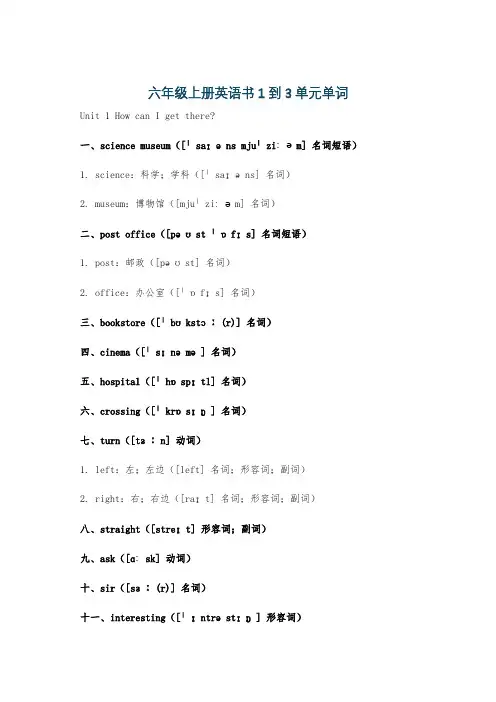
六年级上册英语书1到3单元单词Unit 1 How can I get there?一、science museum([ˈsaɪəns mjuˈziːəm] 名词短语)1. science:科学;学科([ˈsaɪəns] 名词)2. museum:博物馆([mjuˈziːəm] 名词)二、post office([pəʊst ˈɒfɪs] 名词短语)1. post:邮政([pəʊst] 名词)2. office:办公室([ˈɒfɪs] 名词)三、bookstore([ˈbʊkstɔː(r)] 名词)四、cinema([ˈsɪnəmə] 名词)五、hospital([ˈhɒspɪtl] 名词)六、crossing([ˈkrɒsɪŋ] 名词)七、turn([tɜːn] 动词)1. left:左;左边([left] 名词;形容词;副词)2. right:右;右边([raɪt] 名词;形容词;副词)八、straight([streɪt] 形容词;副词)九、ask([ɑːsk] 动词)十、sir([sɜː(r)] 名词)十一、interesting([ˈɪntrəstɪŋ] 形容词)十二、Italian([ɪˈtæliən] 形容词;名词)1. restaurant:餐馆([ˈrestrɒnt] 名词)十三、pizza([ˈpiːtsə] 名词)十四、street([striːt] 名词)十五、get([ɡet] 动词)1. map:地图([mæp] 名词)Unit 2 Ways to go to school.一、on foot([ɒn fʊt] 介词短语)二、by([baɪ] 介词)1. bus:公共汽车([bʌs] 名词)2. plane:飞机([pleɪn] 名词)3. taxi:出租汽车([ˈtæksi] 名词)4. ship:船([ʃɪp] 名词)5. subway:地铁([ˈsʌbweɪ] 名词)三、slow([sləʊ] 形容词)四、down([daʊn] 介词;形容词;副词)五、slow down([sləʊ daʊn] 动词短语)六、stop([stɒp] 名词;动词)七、Mrs([ˈmɪsɪz] 名词)八、early([ˈɜːli] 形容词;副词)十、must([mʌst] 情态动词)十一、wear([weə(r)] 动词)十二、attention([əˈtenʃn] 名词)1. pay attention to([peɪəˈtenʃn tuː] 动词短语)十三、traffic([ˈtræfɪk] 名词)1. traffic lights([ˈtræfɪk laɪts] 名词短语)2. Munich([ˈmjuːnɪk] 名词)3. Germany([ˈdʒɜːməni] 名词)十四、sled([sled] 名词)十五、fast([fɑːst] 形容词;副词)Unit 3 My weekend plan.一、visit([ˈvɪzɪt] 动词)1. grandparents:(外)祖父母([ˈɡrænpeərənts] 名词)二、film([fɪlm] 名词)三、see a film([siːə fɪlm] 动词短语)四、trip([trɪp] 名词)五、take a trip([teɪk ə trɪp] 动词短语)六、supermarket([ˈsuːpəmɑːkɪt] 名词)七、evening([ˈiːvnɪŋ] 名词)九、tomorrow([təˈmɒrəʊ] 名词)十、next week([nekst wiːk] 名词短语)十一、dictionary([ˈdɪkʃənri] 名词)十二、comic([ˈkɒmɪk] 形容词;名词)1. comic book([ˈkɒmɪk bʊk] 名词短语)十三、word([wɜːd] 名词)十四、postcard([ˈpəʊstkɑːd] 名词)。
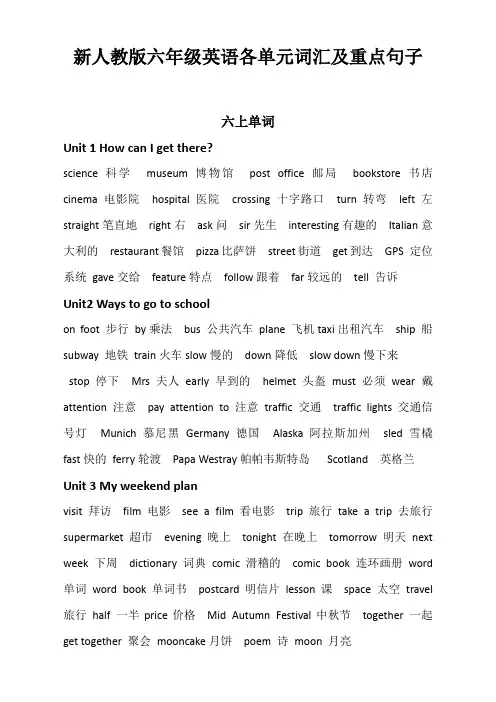
新人教版六年级英语各单元词汇及重点句子六上单词Unit 1 How can I get there?science 科学museum博物馆post office 邮局bookstore书店cinema电影院hospital 医院crossing十字路口turn转弯left左straight笔直地right右ask问sir先生interesting有趣的Italian意大利的restaurant餐馆pizza比萨饼street街道get到达GPS 定位系统gave交给feature特点follow跟着far较远的tell 告诉Unit2 Ways to go to schoolon foot 步行by乘法bus 公共汽车plane 飞机taxi出租汽车ship 船subway 地铁train火车slow慢的down降低slow down慢下来stop停下Mrs 夫人early早到的helmet 头盔must必须wear 戴attention 注意pay attention to 注意traffic 交通traffic lights 交通信号灯Munich 慕尼黑Germany德国Alaska阿拉斯加州sled雪橇fast快的ferry轮渡Papa Westray帕帕韦斯特岛Scotland 英格兰Unit 3 My weekend planvisit拜访film电影see a film看电影trip 旅行take a trip去旅行supermarket超市evening晚上tonight在晚上tomorrow 明天next week下周dictionary 词典comic滑稽的comic book 连环画册word 单词word book单词书postcard明信片lesson课space 太空travel 旅行half 一半price价格Mid Autumn Festival中秋节together 一起get together 聚会mooncake月饼poem 诗moon 月亮Unit4 I have a pen palstudies学习puzzle谜hiking远足pen pal笔友hobby业余爱好jasmine茉莉idea主意Canberra 堪培拉amazing 令人惊奇的shall 表示征求意见goal 射门join 加入club 俱乐部share 分享Unit 5What does he do?factory 工厂worker 工人postman 邮递员businessman 商人police officer 警察fisherman 渔民scientist 科学家pilot 飞行员coach 教练country 乡下head teacher 校长sea 大海stay 保持university 大学gym 体育馆if 如果reporter 记者use 使用type 打字quickly 快的secretary 秘书Unit 6 How do you feel?angry 生气的afraid 害怕的sad 伤心的worried 担心的happy 开心的see a doctor 看病wear 穿more 更多的deep 深的breath 呼吸take a deep breath 深呼吸count 数数count to ten 数到十chase 追mice 老鼠bad 坏的hurt 受伤ill 生病wrong 有毛病should 应该feel 感觉well 健康sit 坐grass 草坪hear 听见ant 蚂蚁worry 担心stuck 陷住mud 泥pull 拉everyone 每人六上句子Unit 1 How can I get there?1. Where is the museum shop?博物馆的商店在哪儿?2..It’s near the door.在大门附近。
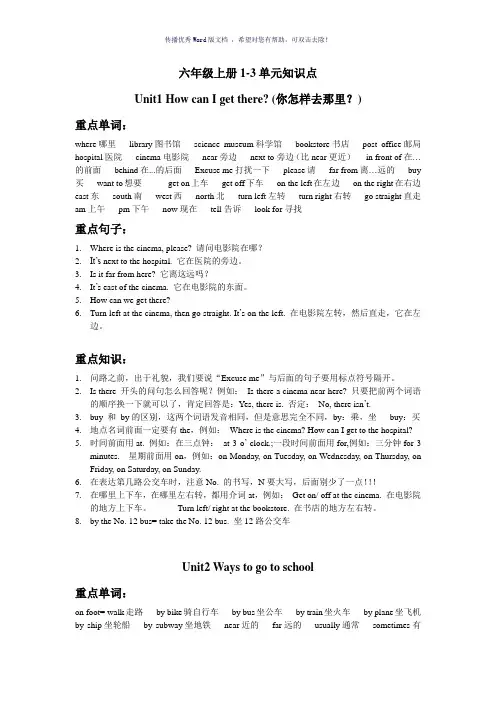
六年级上册1-3单元知识点Unit1 How can I get there? (你怎样去那里?)重点单词:where哪里library图书馆science museum科学馆bookstore书店post office邮局hospital医院cinema电影院near旁边next to旁边(比near更近)in front of在…的前面behind在...的后面Excuse me打扰一下please请far from离…远的buy 买want to想要get on上车get off下车on the left在左边on the right在右边east东south南west西north北turn left左转turn right右转go straight直走am上午pm下午now现在tell告诉look for寻找重点句子:1.Where is the cinema, please? 请问电影院在哪?2.It’s next to the hospital. 它在医院的旁边。
3.Is it far from here? 它离这远吗?4.It’s east of the cinema. 它在电影院的东面。
5.How can we get there?6.Turn left at the cinema, then go straight. It’s on the left. 在电影院左转,然后直走,它在左边。
重点知识:1.问路之前,出于礼貌,我们要说“Excuse me”与后面的句子要用标点符号隔开。
2.Is there 开头的问句怎么回答呢?例如:Is there a cinema near here? 只要把前两个词语的顺序换一下就可以了,肯定回答是:Yes, there is. 否定:No, there isn’t.3.buy 和by的区别,这两个词语发音相同,但是意思完全不同,by:乘,坐buy:买4.地点名词前面一定要有the,例如:Where is the cinema? How can I get to the hospital?5.时间前面用at. 例如:在三点钟:at 3 o’ clock.;一段时间前面用for,例如:三分钟for 3minutes. 星期前面用on,例如:on Monday, on Tuesday, on Wednesday, on Thursday, on Friday, on Saturday, on Sunday.6.在表达第几路公交车时,注意No. 的书写,N要大写,后面别少了一点!!!7.在哪里上下车,在哪里左右转,都用介词at,例如:Get on/ off at the cinema. 在电影院的地方上下车。
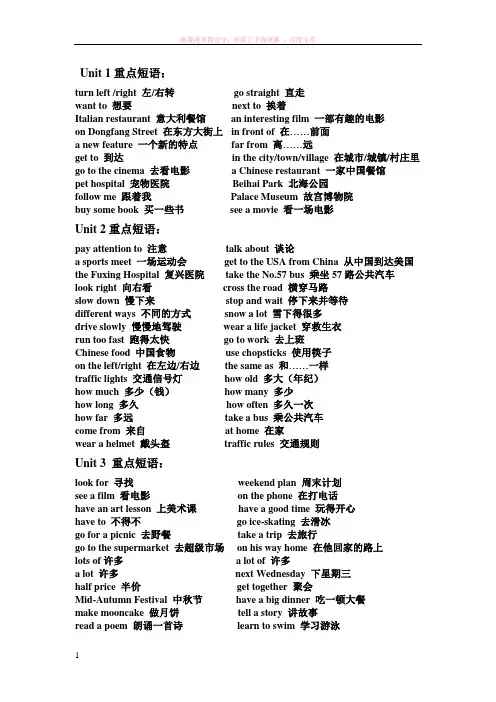
Unit 1重点短语:turn left /right 左/右转go straight 直走want to 想要next to 挨着Italian restaurant 意大利餐馆an interesting film 一部有趣的电影on Dongfang Street 在东方大街上in front of 在……前面a new feature 一个新的特点far from 离……远get to 到达in the city/town/village 在城市/城镇/村庄里go to the cinema 去看电影 a Chinese restaurant 一家中国餐馆pet hospital 宠物医院Beihai Park 北海公园follow me 跟着我Palace Museum 故宫博物院buy some book 买一些书see a movie 看一场电影Unit 2重点短语:pay attention to 注意talk about 谈论a sports meet 一场运动会get to the USA from China 从中国到达美国the Fuxing Hospital 复兴医院take the No.57 bus 乘坐57路公共汽车look right 向右看cross the road 横穿马路slow down 慢下来stop and wait 停下来并等待different ways 不同的方式snow a lot 雪下得很多drive slowly 慢慢地驾驶wear a life jacket 穿救生衣run too fast 跑得太快go to work 去上班Chinese food 中国食物use chopsticks 使用筷子on the left/right 在左边/右边the same as 和……一样traffic lights 交通信号灯how old 多大(年纪)how much 多少(钱)how many 多少how long 多久how often 多久一次how far 多远take a bus 乘公共汽车come from 来自at home 在家wear a helmet 戴头盔traffic rules 交通规则Unit 3 重点短语:look for 寻找weekend plan 周末计划see a film 看电影on the phone 在打电话have an art lesson 上美术课have a good time 玩得开心have to 不得不go ice-skating 去滑冰go for a picnic 去野餐take a trip 去旅行go to the supermarket 去超级市场on his way home 在他回家的路上lots of许多 a lot of 许多a lot 许多next Wednesday 下星期三half price 半价get together 聚会Mid-Autumn Festival 中秋节have a big dinner 吃一顿大餐make mooncake 做月饼tell a story 讲故事read a poem 朗诵一首诗learn to swim 学习游泳go to the swimming pool 去游泳池be afraid of 害怕this morning/afternoon/evening 今天早上/下午/晚上at noon 在中午after lunch 午餐之后Spring Festival 春节Recycle 1 重点短语:police station 警察局at the crossing在十字路口 wait for you 等你sing a song 唱一首歌a big ring 一只大戒指fall down 跌倒;摔破。
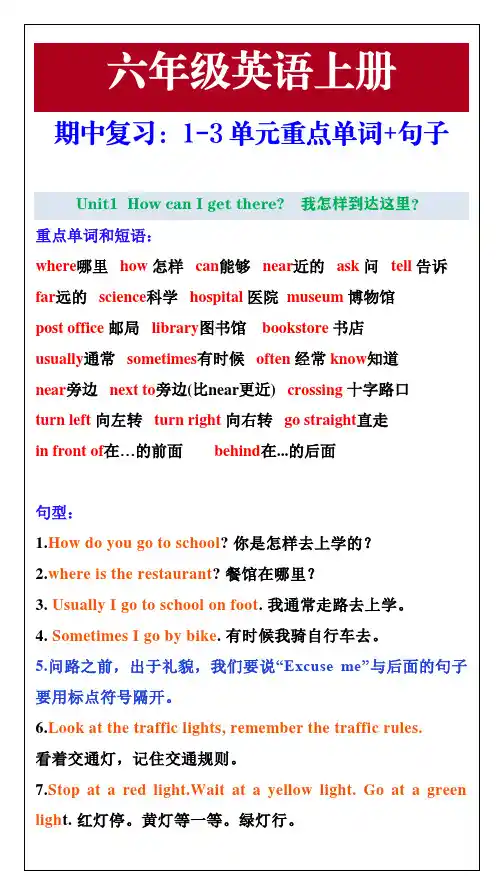
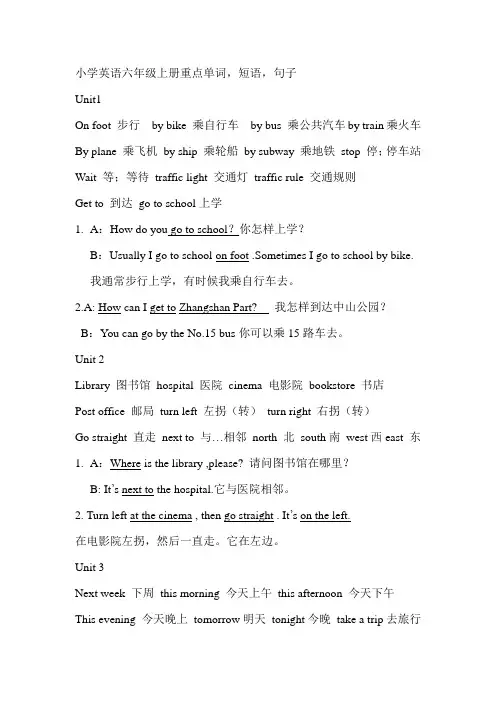
小学英语六年级上册重点单词,短语,句子Unit1On foot 步行by bike 乘自行车by bus 乘公共汽车by train乘火车By plane 乘飞机by ship 乘轮船by subway 乘地铁stop 停;停车站Wait 等;等待traffic light 交通灯traffic rule 交通规则Get to 到达go to school上学1.A:How do you go to school?你怎样上学?B:Usually I go to school on foot .Sometimes I go to school by bike.我通常步行上学,有时候我乘自行车去。
2.A: How can I get to Zhangshan Part? 我怎样到达中山公园?B:You can go by the No.15 bus你可以乘15路车去。
Unit 2Library 图书馆hospital 医院cinema 电影院bookstore 书店Post office 邮局turn left 左拐(转)turn right 右拐(转)Go straight 直走next to 与…相邻north 北south南west西east 东1.A:Where is the library ,please? 请问图书馆在哪里?B: It’s next to the hospital.它与医院相邻。
2. Turn left at the cinema , then go straight . It’s on the left.在电影院左拐,然后一直走。
它在左边。
Unit 3Next week 下周this morning 今天上午this afternoon 今天下午This evening 今天晚上tomorrow明天tonight今晚take a trip去旅行Go to the cinema 去看电影read a magazine 看杂志post card 明信片Comic book 漫画书newspaper 报纸1.A:What are you going to do on the weekend?周末你打算干什么?B: I’m going to visit my grandparents this weekend.这个周末我打算去看望我的外祖父母2.A: Where are you going this afternoon ?今天下午你打算去哪里?B:I’m going to the bookstore.我打算去书店。
六年级英语上册一至三单元重点句子第一篇:六年级英语上册一至三单元重点句子六年级英语上册一至三单元重点句子1、A:Where is the cinema?2、Where is the Italian restaurant?5、What are you going to do today?B:It’s next to the bookstore.Turn right at the hospital.I’m going to see a film.3、Let’s go to the nature park.Hooray4、How do you get there?By bus.6、Where are you going?I’m going to the bookstore.7、When are you going?Next Monday.第二篇:六年级上册英语一单元作文六年级上册一单元The way to the schoolMy home is ually I go to school on foot, Sometimes I go to school by bike.Wu Yifan’s home is far from the school, so he goes to school by bus or by car.第三篇:六年级英语重点句子重点句子句型1、问某人打算或者将要做什么?1)what are you going to do?---I'm going to+动词的现在分词(ing形式)2)What are they going to do ?---they are going to+动词的现在分词(ing形式)2、用why 提问,用because 回答3、问住在哪里?Where do you live ?---I live in+地点4、问穿什么?What do you wear in spring ?---I wear+服装5、问今天是几月几日?What is the date today?---it is+具体的日期6、问某人正在做什么?1)what are you doing ?---I am /we are +动词的现在分词(ing形式)2)What is she /he doing ?---she /he is+动词的现在分词(ing 形式)7、问某人在几年级几班?What class are you in ?--I'm in Class __Grade __8、问什么地方在几楼?Where is the music room ?----It is on the third floor9、问什么节日在什么时候?When is the teacher's day ?---it is on september 10th10、问你喜欢喝吃什么?What would you like to drink/eat?---I'd like some +东西11、问我可以注意什么吗?May I have a rest ?---yes ,of course please12、当别人提出可以帮助你吗?Can I help you ?---yes ,please water the flowers13、问那是谁?Who is this ?--it is+人名14、问他们是谁?Who are they ?---they are +人名15、问那是什么?What is this ?--it is+东西16、问他们是什么?What are they thesethose ?---they are+东西17、this is that is +f单数this is an apple.that is a witchThese are those are +f复数 these are peaches.Those are lilies.第四篇:人教版六年级语文上册三维目标一至三单元教案第一单元教学计划教材分析本组课文带领我们投入大自然的怀抱,领略大自然的风姿,倾听大自然的声音,与大自然互诉心声,交流感受。
新版pep六年级上册英语-各单元知识点总结一:重点单词和短语Science科学, museum博物馆, post office, bookstore, cinema, hospital ,tasty, buy, London Eye伦敦银, stomach胃 ,crossing十字路口, turn left, turn right,go straight=walk straight直走.next to紧挨着/与。
相邻, far from(离。
远), near在。
附近 ,behind(在。
后面) , in front of(在。
前面) , between…and…(在。
和。
之间)二:按要求写单词:hot(反义词)cold , cool(反义词)warm, too(同音词)to/two cannot(缩写)can’t right(反义词)left/wrong buy(同音词)by/bye sea(同音词)see first(基数词)one four(序数词)fourth did (原形)do/does three(序数词)third give(过去式)gave三:重点句型分析1. Where is the museum shop?此问句是由特殊疑问词where 引导的一个特殊疑问句, where意为“在哪里,到哪里”, 用来询问地点, 放在句子的开头。
询问“某人或某物在哪里”的基本句型是:“ Where +is/are+ 主语?”, where is后接名词或代词的单数形式, where are后接名词或代词的复数形式。
表示地点的词:museum博物馆, post office邮局, bookstore书店, cinema电影院, hospital医院 restaurant餐馆bank银行 busstop公交车站lake湖 library图书馆zoo动物园 school学校 park公园 garden花园hotel旅馆2. It’s near the door.此句中near是表示位置的介词, 意为“旁边,附近” , 其同义句是:It’s next to the door.它在门的旁边。
人教版小学六年级上册英语知识点归纳第一单元:四会单词:young年轻的funny滑稽可笑的tall高的strong强壮的kind和蔼的old年老的short矮的thin瘦的Mr先生like像;喜欢strict严格的smart聪明的;巧妙的active积极的;活跃的quiet安静的;文静的very很;非常but但是缩写形式:who’s=who is what’s=what is he’s=he is she’s=she is重要句型:1.Who’s your art teacher?你们的美术老师是谁?----Mr Hu.胡先生.2.What’s he like?他长得什么样子? ----He’s short and thin.他又矮又瘦3.Is she young?她年轻吗?----Yes,she is/No, she isn’t.以前的知识:I have a new math teacher.我有一个新数学老师.(小学三年级已经学过I havea pen.)注意: 划线部分可以替换.第二单元:四会单词:Monday 星期一 Tuesday星期二Wednesday星期三 Thursday星期四Friday 星期五Saturday星期六 Sunday 星期日day天;日子have有;吃on 在……时候too也;太短语:do homework 做作业watch TV 看电视read books 读书What about? ......怎么样?do housework 做家务play computer games 玩电脑游戏重点句型:1.What day is it today?今天星期几?—It’s Monday.星期一.2. What do we have on Mondays?星期一我们有什么课?—We have English,science,computer and P.E.我们有英语课,科学,计算机跟体育课.3.What do you do on Saturdays?星期六你干什么?(具体的某一天前用介词on,在具体的时间前,用介词at)—I often do my homework.我通常做家庭作业.4.What about you?你呢?—I do my homework,too.我也是做家庭作业.第三单元:四会单词:eggplant 茄子fish 鱼green beans 青豆tofu 豆腐potato 土豆tomato 西红柿for 为;给lunch 中餐;午饭we 我们tasty 好吃的;可口的sweet 甜的sour 酸的fresh 新鲜的salty 咸的favourite 最喜爱的;特别喜爱的fruit 水果grape 葡萄缩写形式:they’re=they are don’t=do not重点句型:1.What would you like for lunch?你午餐想吃什么?-----I’d like some tomatoes and mutton.我想吃一些西红柿跟羊肉.2.What’s your favourite fruit?你最喜欢的水果是什么?------/I like apples.我喜欢苹果.3.I don’t like grapes.我不喜欢葡萄.4.Bananas are my favourite.我最喜欢香蕉.第四单元一. 单词:empty the trash倒垃圾cook the meals 做饭water the flowers浇花sweep the floor扫地clean the bedroom打扫卧室make the bed铺床set the table摆餐具wash the clothes洗衣服do the dishes洗碗碟put away the clothes收拾衣服can’t = cannot(不会;不能)use a computer(使用计算机)二. 句子:1. I’m helpful!I can sweep the floor。
六年级上册英语1~3单元单词句子Unit 1 How can I get there?单词:1. science [ˈsaɪəns] (名词)科学。
2. museum [mjuˈziːəm] (名词)博物馆。
3. post office [pəʊst ˈɒfɪs] (名词短语)邮局。
4. bookstore [ˈbʊkstɔː(r)] (名词)书店。
5. cinema [ˈsɪnəmə] (名词)电影院。
6. hospital [ˈhɒspɪtl] (名词)医院。
7. crossing [ˈkrɒsɪŋ] (名词)十字路口。
8. turn [tɜːn] (动词)转弯。
9. left [left] (形容词、副词)左边。
10. straight [streɪt] (形容词、副词)笔直地。
句子:1. Where is the museum shop? [weə(r) ɪz ðə mjuˈziːəm ʃɒp] 博物馆商店在哪里?2. It's near the door. [ɪts nɪə(r) ðə dɔː(r)] 在大门附近。
Unit 2 Ways to go to school.单词:1. on foot [ɒn fʊt] (短语)步行。
2. by [baɪ] (介词)乘。
3. bus [bʌs] (名词)公共汽车。
4. plane [pleɪn] (名词)飞机。
5. taxi [ˈtæksi] (名词)出租汽车。
6. ship [ʃɪp] (名词)大船。
7. subway [ˈsʌbweɪ] (名词)地铁。
8. train [treɪn] (名词)火车。
9. slow [sləʊ] (形容词)慢的。
10. down [daʊn] (介词、副词)向下。
句子:1. How do you come to school? [haʊ duː juː kʌm tuː skuːl] 你怎么来学校的?2. Usually, I come on foot. [ˈjuːʒuəli aɪ kʌm ɒn fʊt] 通常我步行来。
六年级上册英语一至三单元重点单词与四会句子
1. 仔细地;认真地
2. 问;询问
3. 问题
4. 积极地;活泼地
5. 做;制作
6. 声音;噪音
7. 吃8. 应该
9. 去;走10. 早
11. 脏乱;杂乱12. 房间
13. 保持14. 干净的
15. 摆;放16. 家
17. 也;又;过于18. 晚;迟到
19. 看20. 必须;应该
21. 等待22. 尊敬
23. 和;并且24. 他(她、它)们25. 好的;令人满意的26. 年轻的;幼小的27. 孩子们28. 草;草坪
29. 不应该30. 横穿
31. 现在32. 吐痰
33. 地面;地上34. 乱丢杂物
35. 在(几点)36. 早晨;上午
37. 晚上38. 通常
39. 办公室40. 开始;着手
41. 遇见;会见42. 其他;别的
43. 科学家44. 总是;一直
45. 餐;饭46. 经常
47. 有时48. 很少;不常
49. 从来不50. 下午
51. 爱好;兴趣52. 收集
53. 玩具54. 邮票
55. 纸56. 卡片
57. 乒乓球58. 足球
59. 篮球60. (外)祖父(口语)61. 享受…的乐趣;喜欢62. 耕种
63. 钓鱼64. 工具
65. 花66. 喂养;饲养
67. 我将68. 第一;首先
69. 然后70. 得到;买
71. (用颜料)绘画;颜料72. 房子;住宅
73. 剪;切;割74. 黄色的
75. 绿色的76. 蓝色的
77. 认真听老师讲课。
78. 你应该早点上床睡觉。
79. 小心!(当心!)
80. 你必须等。
81. 我早上七点去学校。
82. 我早上七点起床。
83. 他早上六点起床。
84. 他通常在办公室工作。
85. 我喜欢听音乐。
86. 他喜欢踢足球。
87. 我爷爷喜爱耕种。
88. 我的兴趣爱好是绘画。
短语赛
1. 好学生
2. 遵守规则
3. 到校早
4. 听...
5. 大声喧哗
6. 小组长
7. 制定一系列规则8. 交作业
9. 准时10. 上课迟到11. 上学迟到12. 在课上
13. 积极提问14. 保持安静15. 课上吃东西16. 在墙上画画17. 在校18. 在家
19. 好男孩20. 乱扔乱放东西21. 喜欢做。
22. 帮助摆放餐桌23. 看电视24. 整晚
25. 在床上看书26. 上床睡觉27. 很晚睡觉28. 读书
29. 保持你的房间干净30. 早点睡觉31. 看电视到很晚32. 太晚回家33. 保持你的课桌干净34. 横穿马路35. 等待。
36. 等绿灯
37. 随地吐痰38. 不进入草地39. 摘花40. 照顾
41. 照顾好42. 幼小的孩子们43. 尊敬老人44. 帮助老人45. 在街上玩46. 制定标牌47. 做饭48. 我的新朋友49 来自。
50. 把它剪下来51. 起床52. 去上学
53. 上课54. 回家
55. 到家56. 做作业
57. 吃早饭58. 吃午饭
59. 吃晚饭60. 看电视
61. 晚饭后62. 睡觉
63. 每天早晨64. 每天下午
65. 每天晚上66. 在大约七点
67. 从九点到十一点半68. 在早上
69. 在下午70. 在晚上
71. 高兴做。
72. 读你的邮件
73. 对。
友善74. 散步
75. 走很远的路散步76. 从六点十五到七点77. 读报纸78. 浇花
79. 在花园80. 与宠物狗玩
81. 外出82. 去看电影
83. 弹钢琴84. 购物
85. 熬夜86. 熬夜到很晚
87. 去工作88. 社会考察实践活动89. 想了解。
90. 一名著名的科学家91. 在办公室92. 与。
谈话
93. 快速地吃午饭94. 继续工作
95. 会见其他的科学家96. 在外吃饭
97. 吃饭98. 在实验室
99. 向。
学习100. 开始工作
101. 在办公室吃饭102. 收集邮票
103. 对...感兴趣104. 听音乐
105. 打篮球106. 踢足球
107. 打排球108. 喜爱收集玩具车109. 收集图片卡110. 收集糖纸
111. 一家玩具商店112. 在彼德家附近113. 一种新型的。
114. 许多种类的糖纸115. 打乒乓球116. 喜爱读书
117. 喜爱画画118. 对唱歌感兴趣119. 在农场120. 一些有趣的爱好121. 喜爱耕种122. 种花
123. 种菜124. 养动物
125. 养鸡、鸭和一些鹅126. 喜爱钓鱼
127. 擅长... 128. 钓鱼
129. 制作工具130. 喜爱做饭
131. 收集CD 132. 玩耍玩具车133. 做手指画134. 不同的兴趣爱好135. 做几个手指印136. 制作树叶画137. 收集一些树叶138. 取一张纸
139. 完成绘画
140. 把一张树叶放在纸上
141. 给它们涂上不同的颜料
142. 在白纸上画一所房子
143. 取一些颜料和纸
144. 制作你自己的树叶画
145. 给房子涂上颜料
146. 一封来自露西的电子邮件
147. 把它粘到黄纸上
148. 通过绘画制做有趣的东西
149. 展示给你如何制作它
150. 告诉你一些关于我日常生活的事情。